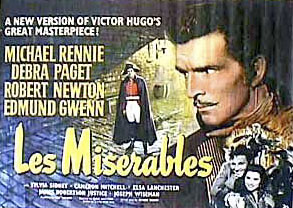
LES MISERABLES
US, 1952, 110 Minutes, Black and White.
Michael Rennie, Robert Newton, Debra Paget, Sylvia Sidney, Cameron Mitchell, Edmund Gwenn, Elsa Lanchester, James Robertson Justice, Joseph Wiseman.
Directed by Lewis Milestone.
Les Miserables is one of the many versions of Victor Hugo's novel that has been popular for so long. Hugo's story of a victim of injustice pursued in the name of the law, whose happiness depends on an inhuman letter of the law mercilessly applied has always aroused people's interest. Its setting of the galleys, provincial France and the Paris of the barricades enhances interest. The theme of injustice versus the law and the ultimate suicide of legalism is a deep and moving one.
Frederic March and Charles Laughton took the parts of Valjean and Javert in 1932. There have been French versions and a superb twelve part serialisation for Italian television in the 60s. This version is completely absorbing and has Michael Rennie give one of his best performances. Robert Newton is effective as Javert. Direction is by veteran Lewis Milestone who made All Quiet on the Western Front in 1930 and Mutiny on the Bounty in 1962.
1. What kept your interest in this film? the character of Jean Valjean, the pursuit by Inspector Javert, the theme of justice and law?
2. How did the prologue set the scene and the atmosphere? the crime itself, the casual attitude of the judge, the penalty, the throwing out of the bread? How did this create a mood as the film starts? Did it help the title make sense?
3. What were your reactions to the French galleys and what happened when the ship seemed to be sinking? (This is the early nineteenth century).
4. What did the galley sequences reveal about Jean Valjean's character? Why was he so bitter? Was he completely savage? note his learning to write, his being restrained by his companions, his parole?
5. What impression of Javert did you have? His father dying in the galleys, his bitterness about life, his worship of law and the codes of law (and his legal support for Valjean's money claim)? Why did Javert pursue criminals? What motivated him? How happy was his life?
6. How did you react to people's contempt for the convict? Was this effectively shown?
7. What was the significance of the episode with the Bishop? Why did the Bishop act as he did? Why did Valjean not understand him? What influence did the incident have on his life?
8. Chance and fate played a dominant part in Valjean's life? for good and evil, How was this shown? eg. the runaway horse, the buying of the pottery factory, the continued reappearance of Javert.
9. Why did Valjean not report to the parole officer? Did he know he could be sent again to the galley? Were you surprised that Valjean could become Madeleine and mayor?
10. When did Javert recognise Valjean? Why did he pursue him?
11. What did the episode with Fantine reveal about Valjean and Javert as human beings? Javert spoke of law, Valjean of justice. Javert thought they were one and the same thing. Why aren't they? Why was Javert so cruel at Fantine's death?
12. How did chance provide for Valjean to live a third phase of his life ? the Bishop and the Convent of the Child Mary, Robert etc.?
13. What compelled Valjean to reveal himself at the trial of Mathieu? Why did his friends not want him to go back to the galleys? How they became so hardened?
14. What did Cosette mean to Valjean? Was he jealous of Marius?
15. What did Marius stand for?
16. Javert said that when he had arrested Valjean his duty had been done. Why was he so bitter when Valjean did not kill him? why would be make no bargains or beg for mercy? Why did he pursue Valjean through the sewer?
17. When Javert allowed Valjean to take Marius inside and actually helped him, how had he betrayed the principles he had stood for all his life? Why did he kill himself?
18. Were you glad the film had a happy ending? To enter into the film, it was necessary to be emotionally involved about injustice, slavery, fate, vengeance etc. How did the film keep you emotionally involved? what technique did it use?